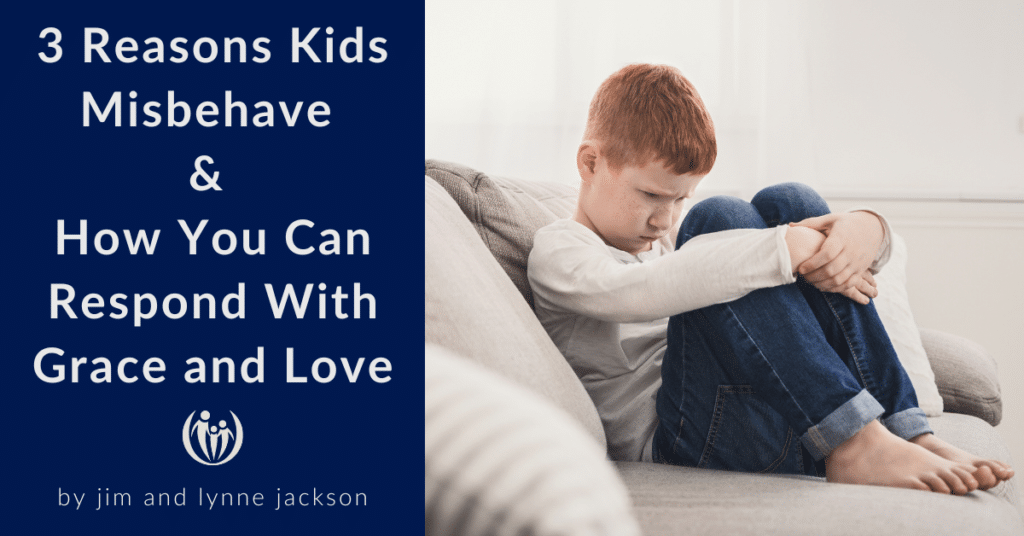
3 Reasons Kids Misbehave & How You Can Respond With Grace and Love

If you’ve got a child who seems to be misbehaving more than usual, it’s time to pause and reflect on what might be driving your misbehaving child. When your child seems to be acting out all of a sudden, you might have a Stressed, Anxious, or Discouraged (“SAD”) child.
These complex emotions are common to all of us. Consider the stressed (and likely hungry) disciples who wanted to give up and retreat because they only had 5 loaves and 2 fish to feed 5,000 people. Anxious Moses, who defiantly refused to lead the Israelites. Discouraged Peter, who told Jesus He was wrong about His imminent suffering and death.
Being “SAD” doesn’t excuse misbehavior. Whether you’re 3, 33, or 93, when any of us are stressed, anxious, or discouraged, our sinful nature is more likely to show its face. When parenting is stressful and discouraging, that’s when we are more likely to be harsh and controlling. And in those difficult situations, how often do we say a vulnerable, honest statement like, “I’m feeling stressed right now and need a little extra support today.”
Understanding what might be under the surface of your child’s behavior makes it easier to empathize and guide your child toward wiser choices. You can be a person of peace in the midst of chaos. You can understand your misbehaving child.
So, what’s going on in kids’ brains when they struggle with outbursts of whining and demanding behavior? Let’s unpack the issues we touched on.
Why do kids misbehave?
It helps to remember that kids generally don’t misbehave to make your life miserable! There are a variety of reasons a child might be acting out with strong emotions. Kids could be:
- Stressed by external circumstances. Life is simply too much. This might be overwhelmed by schoolwork (including possible learning or attention challenges), a packed schedule, an overwhelming mess to clean up, the complexity of getting out of the house in the morning, etc.
- Anxious due to sensory issues (their body feels uncomfortable and their sensory environment feels aversive) or fear about what’s happening in the world. Rejection or even bullying from peers. A sensitive temperament that feels things deeply and picks up on the anxiety of others. Also, gifted kids are generally anxious, with brains buzzing with learning and ideas.
- Discouraged because of feelings of failure, inferiority, or sibling conflict. Problem child identity. A mismatch between their skills and the demands of the task.
In addition to these difficult elements, the fight/flight system is alive and well in youngsters, and it can spark big reactions to stressful, anxiety-producing, or discouraging situations that feel threatening. But, a child’s frontal lobe is very much under construction until their third decade of life, making it less available to regulate and guide a child toward wise responses to these perceived threats.
Another contributing factor in your child’s struggles could be serotonin imbalances, which are common in children. When serotonin is low, kids are easily angry, aggressive, impulsive, irritable, anxious, discouraged, and don’t sleep as well.
Whatever the underlying cause, remember:
Your child’s struggle is not a reflection of their character.
Four-year-old Maria described her inner turmoil after a busy morning with other kids at preschool; “My brain couldn’t make my body stop being mean. My heart is kind, but my body doesn’t listen!”
A negative response with lectures and consequences will only increase your child’s stress and reinforce a “problem-child identity.” When kids off-load their stress, their outbursts are signaling the need for a safe parent to come alongside and coach them through it.
How can I help my misbehaving child?
- Get in their shoes. Ask yourself, “What’s it like to be my child right now?”
- Reframe the situation with compassion. Maria’s mom responded to her struggling daughter, “We’ll get this all figured out! I love your kind heart; it still shines through even when your body doesn’t listen.”
- Enter confidently as an ally and a coach. Communicate, either through your words or actions, “I’m strong enough to handle your difficult feelings. The Holy Spirit comes alongside to comfort and help me so that I can do the same for you!” (John 14:26)
When kids off-load their stress, their outbursts signal the need for a safe parent to come alongside and coach them through it.
Listen deeply, especially when your child is acting out
Julia had big feelings and could have extensive outbursts and long tirades about what she was upset about when those feelings overwhelmed her. Sandra helped her daughter work through her outbursts in a healthy, validating way. “Julia, you have some big feelings! Let’s set the timer for three minutes, and you can tell me everything you’re feeling and upset about. When the timer rings, we’ll problem-solve!” This mom set aside her judgments and listened well, which helped both of them calm down so they could solve the problem.
When we respond with understanding and compassion, we can build an identity in our child as a problem-solver rather than a “problem child.” That’s something to celebrate! We all want home to be a safe place for our family when times are challenging. The goal is not to eliminate chaos and make behavior go away but to invite God’s grace and truth to guide our compassion for our struggling children.
As you learn to listen deeply and empathize with your misbehaving (“SAD”) child, you will often find your child is more receptive to your help. You can provide your child with peace and guidance when they feel sad, anxious, or discouraged.
To dig deeper into practical strategies to help your child, check out these articles:
- 20 Statements That Communicate Empathy to Kids
- Practical Tips to Turn Uncontrolled Emotional Outbursts into Big Wins
- How to Go From Power Struggles to Problem Solving
- Teach your Kids to Apologize…and Mean It

Do you have a child with EXTRA needs?
Parenting isn’t easy, but when you’ve got an extra INTENSE or SENSITIVE child with big feelings… it’s even harder.
The Sensitive and Intense Kids online course will equip you to parent well, even with these unique kiddos.





